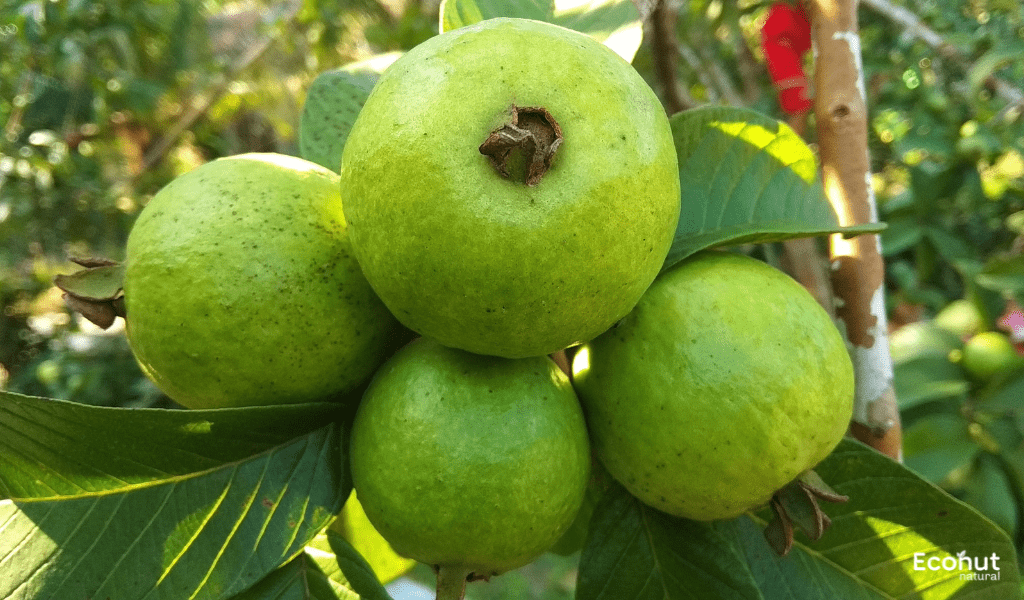The tropical fruit guava (Psidium Guajava), which is widely available globally, keeps you cool during the hot months. Because of its even geographic distribution, it is adored by a great number of people globally. It is the healthiest alternative that may be used by individuals of all ages. It is known as the “Super fruit” due to its unique flavor and several health benefits.
The guava is one of the most common fruits in the world. Due to their extensive geographic distribution, guavas can be enjoyed by most people in most countries. It’s a fantastic, healthy alternative that is suitable for all age groups.
Description
Guava, or Psidium guajava, is a member of the Myrtaceae family. It is an evergreen tree with a maximum height of ten meters. It is a fruit with a pear shape that is edible to people, animals, and birds.
Botanical Name:
Psidium Guajava
Family:
Myrtaceae
Leaves:
Leaf blades are 5–15 x 4-6 cm, oblong to elliptic, with a bluntly acuminate to obtuse apex, a rounded to subcuneate base, and entire, moderately thick and leathery margins. The blades are dull grey to yellow-green above and slightly downy below, with pronounced veins and gland spots. Stipules are absent from the simple, opposing leaves, and the petiole is just 3–10 mm long.
Flowers:
The white flowers that guava produces have a diameter of roughly 3 cm At the intersections where new leaves emerge, these fragrant blossoms can grow alone or in groups of two to three.
Roots:
Guavas spread widely and have a shallow root system. The taproot is present, although it’s not very noticeable. The tree is less resilient to severe winds because of its root system, which also makes it possible for it to easily collect nutrients from the topsoil.
Fruit:
The fruit of the guava tree is its most identifiable feature. Guava fruits can be round or oval-shaped, and they are juicy berries. Depending on the cultivar, they can range in size from little apricots to huge grapefruits.
Seeds:
Easily consumed, guava seeds are high in nutritional fiber. For a variety of purposes, they can be powdered or roasted. But because of their resentment, some find them disagreeable.
Parts Used:
- Fruit
- Leaves
- Seeds
- stem
Dosage:
- Decoction- 10 to 20 ml
Chemical Constituents
A guava’s vitamin C concentration is so high it even exceeds that of an orange. The vitamins A, B6, and E are also present.
Synonyms:
Jmarukh, Sirogoyya, Koyya, Ambak, Segapugoyya,Mriduphalam, Jamphal, Jamrud, Peyara, Kamsharn, Judakaneh, Anjirzad, Segapu, Sengoyya, Amba, Madhuriam, Amuk, Amrud, Koyya, Malakkapera, Pera, and Tupkel,Ettajama, Goyya, Amritphalam, Goacchi, Muhuriam.
Other Language Names of Guava (Psidium Guajava)
Punjabi name – Amrut
French name – Goyave, Goyavier, Gouyave
Italian name – Pero Del India, Guaia giallo
German name – Guavenbaum
English name – Abas, Guava, Govavier, Kuahpa, Kautonga
Hindi name – Amrud
Chinese name – Fan shi liu
Sanskrit name – Amratafalam, Perala
Spanish name – Guayabita, Guayabero, Guayabo, Guayaba, Guyava,
Portuguese name – Guiaiva, Goiabam Goiabero
Telugu name – Giya-pandu, Jama, Jam-pandu
Tamil name – Koyyo, Koyapalam, Segapu
Arabic name – Guwafah
Scientific Classification
| Kingdom | Plantae |
| Subkingdom | Tracheobionta |
| Superdivision | Spermatophyta |
| Division | Magnoliophyta |
| Class | Myrtales |
| Order | Myrtales |
| Family | Myrtaceae |
Ayurvedic Properties
Rasa (Taste) – Madhura (sweet), Amla (Sour)
Guna (Quality) – Guru
Veerya (Potency) – Sheeta (Cold)
Vipaka – (Undergoes taste conversion after digestion)
Prabhava (Effect on tridosha) – Vatapitta shaman
Guava (Psidium Guajava) Uses
- Applying a decoction made from fresh guava leaves to the back can help relieve numerous mental problems, including epilepsy and convulsions, as well as back pain.
- It can assist in the treatment of mild disorders like headache, cold, cough, and body aches brought on by exhaustion.
- Guava (Psidium Guajava) tree leaves boiled in water can be used to treat toothaches and other oral health issues. To achieve this, place four or five guava leaves in a glass of water and boil them until the water in the glass is reduced to half. After that, it can be boiled and used to make gargles later.
- Regular consumption of guava fruits has been shown to strengthen the heart. Numerous Ayurvedic writings further clarify this, stating that sour food strengthens and enhance the heart.
- Additionally regarded as one of the top providers of vitamin C is the guava for this reason, it is quite beneficial to the skin and aids in maintaining its youthful appearance for an extended length of time.
Amrud, Guava (Psidium Guajava) Benefits
Constipation:
The highest dietary fiber content is found in guava, which supports regular bowel motions. As an antibiotic, it stops bacteria from growing in the excretory system and eliminates them, acting as a natural laxative.
Reduces period pain:
According to clinical research, taking 6 mg of guava extract per day helps to lessen dysmenorrhea. Its analgesic properties are actually comparable to those of certain over-the-counter medications.
Weight Loss:
Guava is a great option if you’re trying to lose weight because it helps control your metabolism and ensures that you’re getting enough vitamins, fiber, and proteins. Guavas also keep you full for a long time and are a highly substantial snack.
Blood Sugar Level:
Guava leaves are beneficial to people with diabetes or at risk for developing it. Additionally, it will maintain blood sugar levels and avoid large blood sugar spikes following meals, both of which are beneficial to general health.
Toothache:
It helps lessen gum irritation because it is an anti-inflammatory. It can combat bacteria and stop them from growing further because of its antibacterial properties. Its paste can be used regularly to treat gum swelling, mouth ulcers, etc.
Good for Eyesight:
Vitamin A, which is vital for healthy vision, is abundant in guava leaves. Eating these leaves helps maintain healthy eyes, improves eyesight, and guards against problems relating to the eyes.
Read Also: Common Purslane (Portulaca Oleracea) – Uses, Benefits & Side Effects
Amrud, Guava (Psidium Guajava) Side Effects
Allergic Reactions:
Allergic responses to guava are possible; these are more likely to occur if you have allergies to other tropical fruits. An allergic reaction might cause swelling, itching, or, in extreme circumstances, breathing difficulties.
Blood Sugar:
Guava leaves can reduce blood sugar. Consuming a lot of guava leaves or leaf extract can cause your blood sugar to drop too low if you have diabetes or are pre-diabetic.
High Fiber:
Fiber is healthy for the digestive system, and guavas are a good source of it. But consuming too much fiber too soon can lead to upset stomach, gas, or bloating.
Conclusion
Guavas are full of health advantages, but the leaves are even more beneficial because they contain a lot of phenolic compounds that have antibacterial properties. They treat dental problems and offer protection from infectious infections. Due to its high vitamin C content, guavas strengthen immunity, help control diabetes, support heart health, aid in weight loss, improve digestion, stimulate the brain, improve skin health, reduce stress, and have health benefits for expectant mothers. They also promote eye health, lessen the risk of cancer, and ease menstrual pain. Guavas are a great complement to a balanced diet because of their many health benefits.
FAQS
What adverse consequences does guava have?
It is probably safe to eat guava fruit in edible form. Guava fruit and leaf extract has the potential to be safe when used sparingly as a treatment. For some people, using guava leaf extract may result in transient nausea or upset stomach.
What are the health benefits Guava (Psidium Guajava)?
The fruit and leaves of the plant are among the parts that are utilized medicinally. Guava leaves are used to treat diabetes, ulcers, stomach and intestinal disorders, and discomfort. The fruit is used to treat hypertension.
What is the use of guava fruit in medicine?
The fruit and leaves of the plant are among the parts that are utilized medicinally. Guava leaves are used to treat diabetes, ulcers, stomach and intestinal disorders, and discomfort. The fruit is used to treat hypertension.

